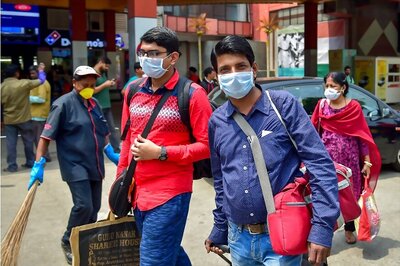
views
Has the Supreme Court verdict on the decades-old Ayodhya dispute resolved the vexed issue? Technically, the answer may be yes, but emotionally, that perhaps is not the case.
Though the Muslim community may have actually reconciled with the situation and accepted it as its destiny, the hearts remain bruised. Question may be asked, why is it like this? Here are some reasons:
An Expected Verdict
For some reasons, most Muslims already knew that the verdict would be along these lines. But why? What made them reach this conclusion?
May be because the present dispensation could not never make them believe in the slogan of “Sabka Saath, Sabka Vikas” (development for all). A major section of Muslims feel the government has meted out a step-motherly treatment towards minorities.
It is not that the government has done nothing for the development of minorities. Some of its policies aimed at ameliorating the condition of minorities deserve praise. Many of its schemes under the Ministry of Minority Affairs, are excellent. Unfortunately, statements of some of the ministers and leaders of the BJP have undone all the good.
This has deepened the minorities’ fear and distrust in the government. Hence, though the Ayodhya verdict has been given by the Supreme Court, Muslims feel justice has not been done to them.
This is nothing but trust deficit which neither the government nor the court has tried to dispel. As courts are supposed to side with justice and not run the government, this issue didn’t seem much of its responsibility, anyway.
Good Riddance
According to media reports, everyone is saying we have now left behind the problem. But that is not the case. Minorities are hugely disappointed by the SC verdict, but they have reconciled to this fact that the country has got rid of the dispute.
This battle of honour that was dragging on for decades is a passé now. The contradictory emotions of despair and desire for peace aptly reflect the present mood of the Muslim community. They are disappointed because they feel let down as those who had brought down the mosque in 1992 has received validation. They have been vindicated.
It is another thing that the Supreme Court has termed the demolition of the Babri Masjid as a violation of law, as the verdict has been in the favour of those who had committed the act in the first place.
On the other hand, the community feels greatly relieved and that is precisely why there has been no protest anywhere in the country against this verdict.
This is not because the government and religious institutions had appealed for peace, but because a large section of the community feels this dispute was not less than an abuse for them. There have been numerous riots over this dispute, houses torched and thousands rendered homeless.
Soon after the apex court read out its judgment, all these have stopped. The Supreme Court has brought the curtain down on one of the basic issues of animosity between Hindus and Muslims.
Now they can go about their usual business without any fear. Their children can go to school safely. Whatever damage had to be done, it happened in 1992. What now remained was just a formality.
Is the Issue Resolved?
This is the most distressing part of this entire episode. Actually, it is not over yet. Especially for the educated section of the community active on social media. They have expressed their displeasure. But there has been a marked change in the way they are reacting now in comparison to say, how people of the earlier generation had responded to the situation years agp.
Earlier, the reaction mainly came from the lower strata of Muslims, while the educated middle-class remained mum. This has now changed. This time, this educated section is unable to reconcile with the decision. This is a new phenomenon.
For example, those who have openly expressed their displeasure over the verdict on social media include the likes of Tasleem Rahmani and Rana Ayyub.
They do not belong to the section of the community who will get swayed by the call of maulvis (clerics) and this may be worrisome as the ones who are voicing their discontent so vociferously this time were silent in 1992. What is it that needs to be addressed? Have a close look at it — it is not the India of 1992.
What Good is Five-acre Land?
There is a murmur among community members that they should not accept the five-acre land. They feel that if they accept this land, then it would be proved that their claim on Babri Masjid was wrong.
Also, some are referring to the Shariyat law. According to the Shariyat, there is no meaning of a masjid on a land given in donation by the government.
Most of the Muslims seem to agree on the point that the community must express its muted opposition/protest by refusing the land offer. Besides, this suit was not about five-acre land, but for laying claim over Babri Masjid and this remains a hot topic on social media.
Way Forward
The curtain has fallen on the dispute of Babri Masjid. What now? The press conference of the head of the Rashtriya Swayamsevak Sangh (RSS) and Prime Minister Narendra Modi’s address to the nation reveal that they are worried about the future and well aware of the consequences of sending across a wrong message.
Modi, Chief Justice of India Ranjan Gogoi or Congress leader Rahul Gandhi — all of them would be gone one day, but India will remain, a new generation would take over and a new India would be reborn.
I feel though the verdict has been given, the long and deep acrimony is yet to reach a closure. This is the biggest task that still remains.
The RSS head has taken a cautious step in this direction by saying that Kashi and Mathura have nothing to do with the Supreme Court ruling. Now, the government has to do its bit.
One has to keep this in mind that it’s not the land, but its people that make the nation. To carry all the people along is a collective responsibility and the most important role here is that of the government.
A representative of one of the parties to the Babri issue, late Hashim Ansari, used to say that even if he won the legal battle, the construction of the Masjid would not begin till he won the hearts of his Hindu brethren of the land.
There is a message here for the people of India. Triumph or defeat, take the people along, but is anybody listening?
(Views expressed are personal)

















Comments
0 comment